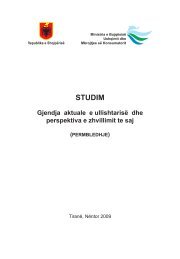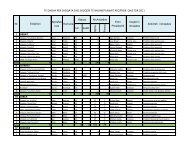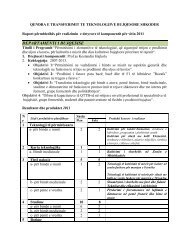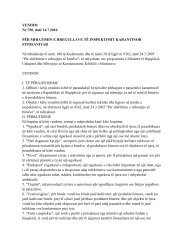MEAT Sector Analyse
MEAT Sector Analyse
MEAT Sector Analyse
- TAGS
- sector
- analyse
- mbumk.gov.al
You also want an ePaper? Increase the reach of your titles
YUMPU automatically turns print PDFs into web optimized ePapers that Google loves.
Training needs for farmers<br />
Meat <strong>Sector</strong> Study<br />
First farmers must get identified who have the potential to produce livestock in a<br />
commercially viable way by the end of 2012. Based on today’s knowledge the following<br />
courses should be offered to farmers by the public extension service and private experts in<br />
the following fields:<br />
• Livestock management (animal welfare – also during transport, breeding, nutrition,<br />
GAP, veterinary issues, animal identification, hygiene concerning production and onfarm-slaughtering,<br />
basic food processing);<br />
• Manure storage and management;<br />
• Occupational health and safety;<br />
• Making use of market information systems;<br />
• Intensified cooperation among the farmers, for example by setting up producer groups.<br />
Training needs for slaughterhouse’s staff<br />
Courses should be offered to employees of slaughterhouses by the public extension service<br />
and private experts including ones from ADAMA (Albanian Dairy and Meat Association) in<br />
the following fields:<br />
• Management (writing business plans, financing, accounting, human resources<br />
development ...);<br />
• In-company training for workers, industrial abattoir workers and deboners / trimmers<br />
regarding new technology, food safety ...;<br />
• National and EU standards from animal welfare, occupational health and safety, food<br />
safety systems to environmental issues (like rendering plants).<br />
Training needs for meat processor’s staff<br />
Courses should be offered to employees of meat processing companies by the public<br />
extension service, ADAMA and private experts in the following fields:<br />
• Management (writing business plans, financing, accounting, human resources<br />
development, language skills, opening export markets ...);<br />
• In-company training for workers (new technology, food safety ...);<br />
• National and EU standards from animal welfare, occupational health and safety, food<br />
safety systems to environmental issues (like rendering plants).<br />
Training needs for the public administration<br />
The civil servants should be brought in the position to understand how commercial<br />
companies are functioning; just by understanding the farmers and processors the staff of<br />
NFA, MAFCP and other subordinated institutions will be in the position to advice and support<br />
them – also in respect to their upcoming IPARD applications:<br />
• Workshops on EU guidelines from farm to fork including directives for meat plants and<br />
their application in the meat industry;<br />
• IPARD applications (design and evaluation of investment projects, application forms ...);<br />
• Training in the practices of general food safety and HACCP application plus traceability<br />
in the food chain;<br />
• Laboratory requirements and techniques in the meat industry;<br />
• General business training to include such topics as overall cost control and analysis,<br />
cost price calculations, selling price setting and negotiation techniques, the importance<br />
of the market chain etc.;<br />
• English language courses;<br />
Meat <strong>Sector</strong> Study, page 63








